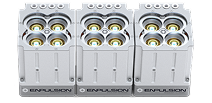Development, Production, and Testing of the IFM Nano FEEP Thruster
Abstract:
With the rising market in small satellite constellations and emerging New Space companies, the demand in propulsion systems for Cubesats and small satellites grew rapidly in recent years. Due to its compact design, its versatile operation, and its plug-and-play character, the IFM Nano Thruster was and is an electric propulsion system advantageously suitable for the needs of a wide variety of space mission applications. The thruster is an indium-consuming eld-emission electric propulsion (FEEP) system that is the result of more than 20 years of research on liquid metal ion sources (LMIS), and ts into less than 1U generating 350 µN of nominal thrust at very high speci c impulse. With a high demand in number of thrusters, the production rate and testing capability alike had to be set up accordingly. This paper summarizes the transition of the thruster technology towards a product, and the unprecedented challenges associated to mass production of electric propulsion systems. Further, with almost 100 thrusters delivered, a statistical analysis of the production data is presented to demonstrate the resulting quality.



